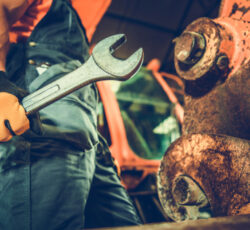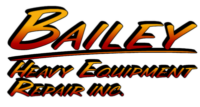Common Heavy Equipment Maintenance Mistakes to Avoid
 Proper maintenance is essential for keeping heavy equipment in optimal condition and ensuring safety on construction sites. Unfortunately, many equipment owners and operators make common maintenance mistakes that can lead to costly repairs, downtime, and even accidents. In this blog post, we will discuss some of these common mistakes and provide tips on how to avoid them.
Proper maintenance is essential for keeping heavy equipment in optimal condition and ensuring safety on construction sites. Unfortunately, many equipment owners and operators make common maintenance mistakes that can lead to costly repairs, downtime, and even accidents. In this blog post, we will discuss some of these common mistakes and provide tips on how to avoid them.
1. Neglecting Regular Inspections
Regular inspections are crucial for identifying potential issues before they become major problems. Some equipment owners may neglect regular inspections, assuming that everything is working fine. However, small issues, such as leaks, loose bolts, or worn-out components, can lead to expensive and avoidable breakdowns. Make it a priority to perform regular inspections and address any issues promptly.
2. Improper Lubrication
Proper lubrication is essential for reducing friction and wear on heavy equipment. Many equipment operators make the mistake of either over-lubricating or under-lubricating the machinery. Over-lubrication can lead to excess grease buildup, causing debris to stick to the equipment and potentially damage moving parts. On the other hand, under-lubrication can result in increased friction and premature wear. Refer to the equipment manufacturer’s guidelines for the correct lubrication schedule and use the recommended lubricants.
3. Ignoring Fluid Checks and Changes
Regular fluid checks and changes are vital for maintaining the performance and longevity of heavy equipment. Neglecting to monitor and replace fluids, such as engine oil, hydraulic fluid, and coolant, can lead to equipment breakdowns and decreased efficiency. Develop a maintenance schedule that includes regular fluid checks and changes, and be proactive in identifying any leaks or abnormalities.
4. Incorrect Fuel Management
Using low-quality or contaminated fuel is a common mistake that can severely impact heavy equipment performance. Poor fuel quality can lead to engine problems, decreased efficiency, and increased fuel consumption. Always use high-quality fuel from reputable sources and consider incorporating fuel additives to improve engine performance and prevent fuel system issues.
5. Neglecting to Clean Equipment
Proper cleaning should be a regular part of equipment maintenance, but unfortunately, it is often overlooked or neglected. Failing to clean heavy equipment can lead to dirt and debris buildup, which can clog filters, affect engine performance, and accelerate wear. Set aside time for routine cleaning to remove dirt, grime, and any corrosive materials. Pay extra attention to hard-to-reach areas and use appropriate cleaning agents and tools for different surfaces.
6. Skipping Operator Training
Operator training is crucial for not only ensuring equipment safety but also preventing potential maintenance issues. Inadequate training can result in improper operation, leading to unnecessary wear and tear on equipment components. Invest in comprehensive operator training programs that cover proper startup and shutdown procedures, safe operation techniques, and equipment-specific maintenance protocols. Regular refresher courses can also help operators stay updated with best practices and new technologies.
7. Delaying Repair and Maintenance
Procrastinating repairs or maintenance can have severe consequences for heavy equipment. Ignoring warning signs, such as strange noises, vibrations, or performance issues, can lead to more significant and costlier repairs down the line. Develop a proactive maintenance schedule and encourage prompt reporting of any operational abnormalities or concerns. Timely repairs and maintenance can prevent further damage and minimize equipment downtime.
8. Failing to Keep Records
Maintaining detailed maintenance records is essential for tracking equipment performance, identifying patterns, and planning future maintenance activities. Many equipment owners make the mistake of not keeping thorough records, which can lead to missed inspections, incomplete repairs, and inadequate maintenance schedules. Utilize digital tools or software designed for equipment maintenance record-keeping to monitor all maintenance activities, including inspections, repairs, parts replacements, and fluid changes.
Conclusion
By avoiding these common heavy equipment maintenance mistakes, equipment owners and operators can prolong the life of their machinery, prevent costly breakdowns, and ensure a safer working environment. Regular inspections, proper lubrication, regular fluid checks and changes, correct fuel management, equipment cleaning, operator training, prompt repair and maintenance, and maintaining detailed records are all essential for effective heavy equipment maintenance. Remember, investing time and effort into proper maintenance practices will ultimately lead to increased productivity, reduced downtime, and significant cost savings in the long run.
